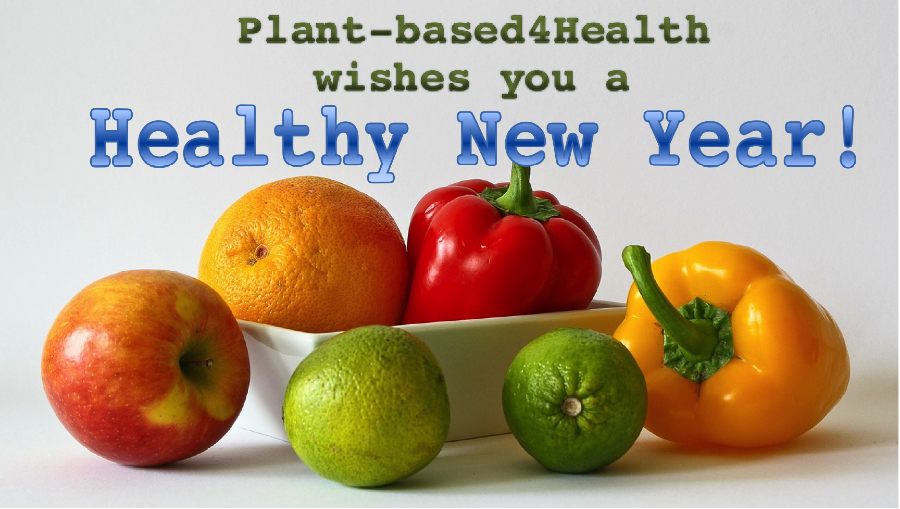
by plant4health | Dec 30, 2015 | Healing, Nutrition, Plant-based, Recipes, Vegan, WFPB, Whole food, Whole food, plant-based
 It’s a huge challenge to eat healthy during the holidays. Overindulgence of rich and sugary foods goes hand-in-hand with the season of giving, making it difficult to find a balance between holiday traditions and healthy eating. After the celebrating is over, we look to the new year in hopes of regaining our equilibrium. It’s the perfect time to renew the commitment towards making healthier choices.
It’s a huge challenge to eat healthy during the holidays. Overindulgence of rich and sugary foods goes hand-in-hand with the season of giving, making it difficult to find a balance between holiday traditions and healthy eating. After the celebrating is over, we look to the new year in hopes of regaining our equilibrium. It’s the perfect time to renew the commitment towards making healthier choices.
I invite you to join me in reclaiming healthy eating habits. I’m not talking about the dreaded “d” word – “dieting”. “Dieting” is filled with the negativity of depriving yourself of the foods your body has become addicted and emotionally attached to. (Learn more about your brain and food addiction.)
(more…)
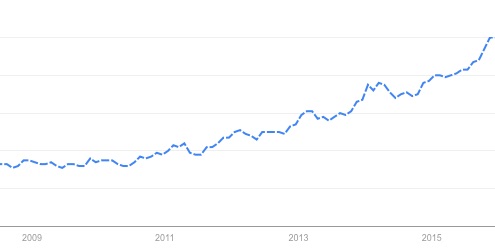
by plant4health | Dec 22, 2015 | Healing, Nutrition, Plant-based, Vegan, WFPB, Whole food, plant-based

Google search results for “Veganism – Diet”
As 2015 comes to a close, I’d like to thank all of our supporters and regular readers of plant-based4health.com. My sister-in-law, Kathy Parnay, and I launched the site in January 2015 as a way to share tips, resources, blog posts and recipes with people who are inspired to learn about and try a whole food, plant-based (vegan) diet to prevent or reverse chronic disease.
Kathy knows first hand about the healing power of a low glycemic, alkalizing plant-based diet. Her husband, Stefan, cured his prostate cancer on this diet, avoiding the surgery, chemo and radiation that his doctors strongly recommended. See their story: Our Journey with Prostate Cancer – A Wife’s Perspective. It is well documented that a whole food, plant-based diet can help people reverse Type 2 diabetes and heart disease, reduce cholesterol and blood pressure and lose weight. Sites like Physicians Committee for Responsible Medicine, PCRM.org, the T. Colin Campbell Center for Nutrition Studies, Dr. Michael Greger’s NutritionFacts.org, and Dr. John McDougall’s Health and Medical Center continually publish evidence-based articles and personal stories supporting the health benefits of whole food, plant-based nutrition.
Here are some of our popular posts and articles from this year: (more…)
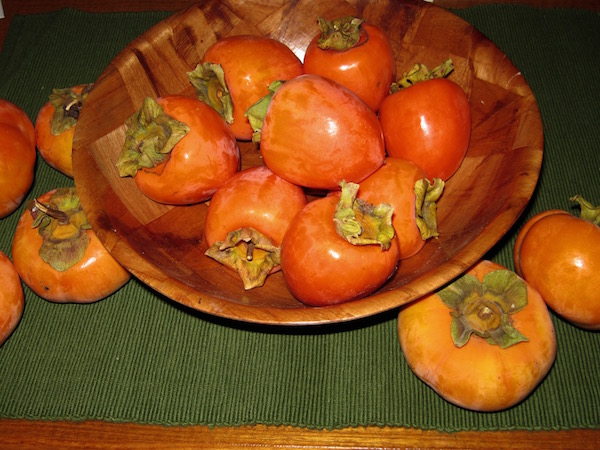
by plant4health | Dec 8, 2015 | Healing, Nutrition, Plant-based, Recipes, Vegan, WFPB
 Most people underestimate the nutritional value of Persimmons.
Most people underestimate the nutritional value of Persimmons.
Persimmons are a strange fruit. In late Fall in Northern California, you can find this plump fruit dangling from bare tree limbs, hanging on as if afraid to let go. Persimmons have a delicately mild sweet flavor and a firm apple-like consistency (Fuyu variety) or a soft and stringy texture (Hachiay variety). Until recently, I didn’t pay much attention to the potential value of their nutrients, being prejudice against their unusual textures and lack of distinct robust flavor. However, upon urging from my daughters and the generosity of my mother-in-law’s bountiful trees, we have incorporated this fruit into our Fall diet this year. Much to my surprise, Persimmons have become a wonderful complement to our plant-based meals.
This seasonal fruit holds a amazing amount of healing nutrients. Persimmons are: (more…)
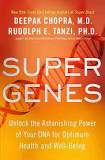
by plant4health | Nov 22, 2015 | Epigenetics, Healing, Nutrition, Organic, Whole food, plant-based
Dr. Deepak Chopra, M.D., author of 80 books and co-founder of the Chopra Center for Well-Being and founder of the Chopra Foundation, recently spoke in Los Altos Hills, CA about his new book, Super Genes, which he co-wrote with Rudolph Tanzi, PH.D. Here is a brief summary of his presentation embellished with information from the book, noted in quotes.
Super genes are your body’s self-regulating building blocks, which are constantly sending instructions to your body. The super genome consists of three components: genome, epigenome and microbiome.
- Genome: you have 23,000 genes in your body and 100 trillion cells – more cells than all the stars in the Milky Way galaxy! A gene is a unit of heredity and carries memories of a cosmic nature spanning 14 billion years.
- Epigenome: a sheath of proteins that encloses DNA. It is a switching mechanism that enables your cells to respond to your experiences. Epigenetics is the study of gene expression influenced by external factors and your environment. Examples include environmental toxins, stress, diet, relationships and even your thoughts and emotions. Every experience you have makes your genes express themselves. Negative emotions like fear, guilt, and shame cause the self-regulation to get disrupted and that can result in illness.
- Microbiome: colonies of bacteria that line your gut and can be found on your skin. There are trillions of them in your body, over 2,000 species. Bacteria is essential to humans and makes digestion possible.
(more…)
![FACT: Our genes DO NOT dictate our health]()
by plant4health | Nov 19, 2015 | cancer, Healing, Nutrition, Organic, Plant-based, Vegan, WFPB, Whole food, Whole food, plant-based
 We’ve all heard it many times, “Breast cancer runs in my family”, “It’s no surprise I have heart disease since my father and his father before him did,” or “Everyone in my family has high blood pressure, so I’m sure I will too.”
We’ve all heard it many times, “Breast cancer runs in my family”, “It’s no surprise I have heart disease since my father and his father before him did,” or “Everyone in my family has high blood pressure, so I’m sure I will too.”
We accept the “diseases of old age” (cancer, cardiovascular disease, high blood pressure, diabetes, arthritis, etc.) as inevitable based on our family history, believing that our genetics predetermines our health.
Thank goodness this belief has been scientifically proven false!
We actually have a significant amount of control over our health as we age – yes, even over our DNA. This news is very empowering!
Our genes do not cause disease. We’ve been taught that our DNA provides a predetermined script of who we are; hair and eye color, shape of our face, height, etc. Thanks to the findings from the Human Genome Experiment (2003), science has identified which genes are associated with specific diseases. From this data, scientists had theorized that if your DNA consisted of a certain gene, then you would develop the disease that gene represents. (more…)
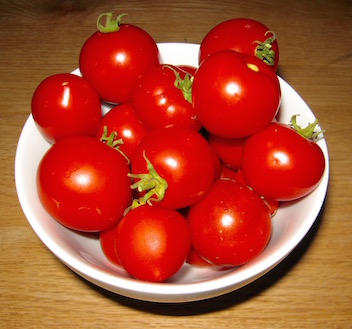
by plant4health | Oct 15, 2015 | cancer, Healing, Nutrition, Organic, Plant-based, Recipes, Vegan, WFPB, Whole food, Whole food, plant-based
 Eating a variety of whole plant-based foods is essential for healing and maintaining excellent health. Science is now discovering that some foods, when eaten together, increase the effects of their individual nutrients, providing even greater health benefits. This is called food synergy. Last month I wrote about lemons. Today, it’s all about tomatoes.
Eating a variety of whole plant-based foods is essential for healing and maintaining excellent health. Science is now discovering that some foods, when eaten together, increase the effects of their individual nutrients, providing even greater health benefits. This is called food synergy. Last month I wrote about lemons. Today, it’s all about tomatoes.
It’s well known that tomatoes are an excellent source of antioxidants: beta-carotene, vitamin E, and vitamin C. But did you know that they are also rich in potassium and a very good source of copper, manganese, dietary fiber, vitamin B6, folate, niacin, and phosphorus? And have you heard that tomato peels contain all four major carotenoids that help protect your body from cancer? When tomatoes are cooked, the lycopene (one of the major carotenoids that lowers the risk of cardiovascular disease and certain cancers) becomes even more bioavailable, increasing the amount your body can absorb.
What’s even more amazing is that when tomatoes are combined with cruciferous vegetables, avocados or olive oil, a synergistic effect occurs that enables your body to more easily absorb and use those powerful anti-cancer and healing nutrients.
Tomatoes and Cruciferous Vegetables – Individually, tomatoes and cruciferous vegetables (broccoli, cauliflower, cabbage, etc.) contain cancer-fighting properties, each food providing distinctive bioactive compounds that fight cancer in different ways. Research has discovered that, when tomatoes and cruciferous vegetables are combined, cancer fighting properties of each are significantly enhanced as the carotenoids in tomatoes increase the bioactive components found in the vegetables. One study at the University of Illinois focused on the synergistic effect of broccoli and tomatoes. They discovered that the tumor-inhibiting effects are significantly enhanced when broccoli and tomatoes are eaten together. It has also been found that chopping and then heating the vegetables makes the cancer fighting compounds even more active. The cutting process breaks the cells and activates an enzyme that initiates a cellular process that results in increased cancer protection. And, as I mentioned in last month’s Lemon Synergy blog, adding a little lemon juice to broccoli increases that enzyme activity. However, be careful of overcooking cruciferous veggies as it results in decreasing their nutrient power. It’s best to steam or sauté lightly.
Try these simple recipes:
Tomatoes and Avocados or Olive Oil – Science has proven that lycopene is fat soluble. As a result, consuming healthy fats with tomatoes increases your body’s absorption rate of the lycopene. According to a study from Ohio State University, when tomatoes are eaten along with avocados or olive oil, the body’s absorption of lycopene is increased up to 15 times. In addition, in 2000, a study in Free Radical Biology and Medicine revealed that, when people consumed tomato products with extra-virgin olive oil versus sunflower oil, researchers discovered that olive oil raised the antioxidant activity of the lycopene in tomatoes. However, consuming sunflower oil produced no effect.
Try these simple recipes:
- Food.com’s Simple Tomato and Avocado Salad
- Add tomatoes and avocado to your salad or use olive oil in your dressings
- Roast or sauté tomatoes with onion and red bell pepper and a little olive oil, garlic, Italian herbs and sea salt. Once cooked, blend in a food processor or blender until the desired consistency then serve over pasta or your favorite grain. Ta da! You’ve got a delicious, high powered nutritious sauce to go with your meal.
Next time you go grocery shopping, don’t forget your tomatoes.

 It’s a huge challenge to eat healthy during the holidays. Overindulgence of rich and sugary foods goes hand-in-hand with the season of giving, making it difficult to find a balance between holiday traditions and healthy eating. After the celebrating is over, we look to the new year in hopes of regaining our equilibrium. It’s the perfect time to renew the commitment towards making healthier choices.
It’s a huge challenge to eat healthy during the holidays. Overindulgence of rich and sugary foods goes hand-in-hand with the season of giving, making it difficult to find a balance between holiday traditions and healthy eating. After the celebrating is over, we look to the new year in hopes of regaining our equilibrium. It’s the perfect time to renew the commitment towards making healthier choices.




